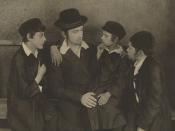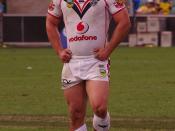Eckehart saw hell, too. He said the only thing that burns in hell is the part of you that wont let go of your life - - your memories, your attachments. You burn them all away. But they're not punishing you, he said; they're freeing your soul. So the way he sees it, if you're frightened of dying and you're holding on, you'll see devils tearing your life away. But if you've made your peace, then the devils are really angels freeing you from the earth. Eckehart's philosophy consisted of four different stages which is used to explain a man's state of mind while conscious or in purgatory. The four stages of the philosophy consist of the following: dissimilarity (when man is separate from God) similarity (Man is not separate from God) identity (When man understands his role in the world) breakthrough (When man can accept his fate). This philosophy can be seen in the movie "Jacob's Ladder"through the life of the main character Jacob Singer.
In the movie Jacob's Ladder, Jacob Singer experiences Eckehart's four staged philosophy throughout his journey while conscious or in purgatory, these included: dissimilarity, similarity, identity and breakthrough.
The first stage Jacob experienced on his journey was the stage of dissimilarity. Referring to Eckehart, dissimilarity is the state of mind when man is separate from God, meaning, doing things that God would see incorrect or unjust. For example, in the movie "Jacob's Ladder", Jacob Singer experiences the dissimilarity stage in the beginning of the movie, while taking part in the Vietnam war. Knowing that enrolling in the Vietnam war is totally voluntary, Jacob enrolled himself to take part in the war. At this point in the movie, Jacob has experienced the dissimilarity stage. By Jacob enrolling into the Vietnam war and taking the lives of other people, separated him from God. Jacob had played God in the war by taking the lives of other people. That was Jacob's experience of the dissimilarity stage. Later in the movie, Jacob experiences the second stage of Eckehart's philosophy.
Jacob experiences the similarity stage toward the middle of the movie. This is experienced when Jacob is denied by the lawyer (Jason Alexander) in taking Jacobs case. Also, his friends who were supposed to be behind him and help support him also denied him while in purgatory. This part in the movie reflects how Peter denies "ÃÂJesus Christ' in the Bible. Both the lawyer and his friends represent the Peter and Jacob represents "ÃÂJesus', who was denied. After Jacob experiences the stage of similarity he goes onto experience the stage of identity.
The third stage Jacob experiences is the stage of identity. This stage is thought to be when man understands his role in the world. Jacob in the movie realizes his role when he looks at the pictures of his children and family while in purgatory. He finally realized reality at this point in the movie. He recognized his real life and distinguished between his real wife and daemon girlfriend "ÃÂJezzabelle'. He also recognized his children while in purgatory by looking at a set of make-believe pictures. At this point Jacob overcame illusion and came to understand reality. The breakthrough stage is the final stage experienced by Jacob, and is the fourth stage in which completes Eckehart's philosophy.
The fourth stage Jacob experiences is the breakthrough stage. This stage occurs when man can accept his fate. In Jacob's Ladder, Jacob experiences this stage when he finally dies in the war. He let go of life and finally accepted death. No longer in purgatory, Jacob is met by his dead son Gabriel at the bottom of a set of stairs. The stairs symbolizing "ÃÂheaven'. As they reunited, Jacob was happy to see his son and Gabriel takes his father Jacob up to heaven, in which they will start a new life together.
Jacob experiences the four stages of Eckehart's philosophy on his journey in the movie "Jacob's Ladder". He experiences dissimilarity stage while in the Vietnam war. He experiences the similarity stage when he is denied by his lawyer and friends. Jacob experiences the identity stage by looking at pictures of his family realizing his role in the world. Finally, Jacob experiences the breakthrough stage when he learns to accept his fate at the end of the movie being death.





